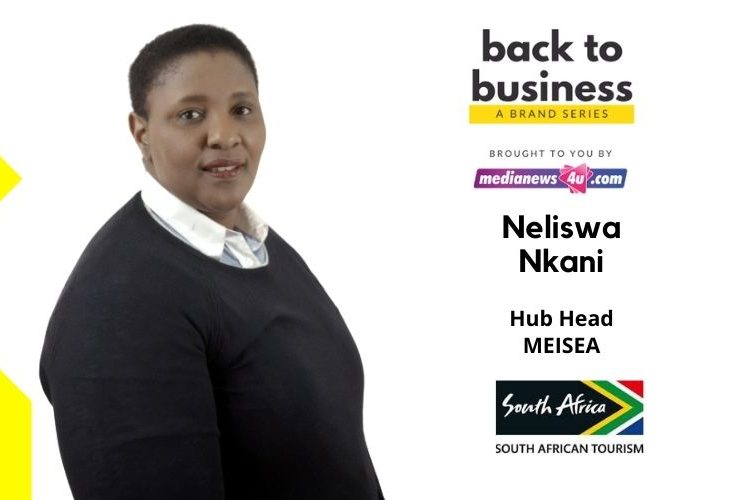The new normal in a world where Covid-19 unfortunately is becoming a part of our life will bring about many changes in the way businesses will be conducted, and more importantly the way we live our life.
In a world post-lockdown where the rules of the game are set to change, or rather have already changed, the way forward for the travel and tourism industry is absolutely in the dark.
The nation-wide lockdown is slowly being lifted across orange and green zones and life is slowly crawling back to a new-normalcy. Businesses and brands are now are making their way back into the business; planning their communication plans for a new world post the covid-19 lockdown.
In this story of Medianews4u’s new brand series, Back to Business, we spoke to Neliswa Nkani, Hub Head – MEISEA, South African Tourism.
How are you coping with the impact of Covid-19 on the Tourism sector? How effectively have you used the lockdown period?
The lockdown owing to the global pandemic has been challenging for businesses at large. In India, we have been aggressively promoting virtual tourism experiences in consumer media spaces. At South African Tourism, we believe that virtual reality can be used as an effective destination brochure. It allows consumers a look and feel of the product, and aids in building aspiration.
We realized the importance of virtual reality early on, and partnered with Google Street View in 2016 to bring the destination alive to give potential travelers and explorers a taste of the South African Mzansi Experience. Mzansi originates from umzantsi, which is Xhosa for low or south. In 2017, team of nature-loving South Africans in partnership with Google Street View also released a large collection of 360-degree imagery of the country’s wildest areas. The trails extended Street View imagery of South Africa’s wilderness areas to include all 19 national parks, 17 previously ‘un-trekked’ nature reserves and many sites of natural, cultural and historical significance in all nine provinces of South Africa.
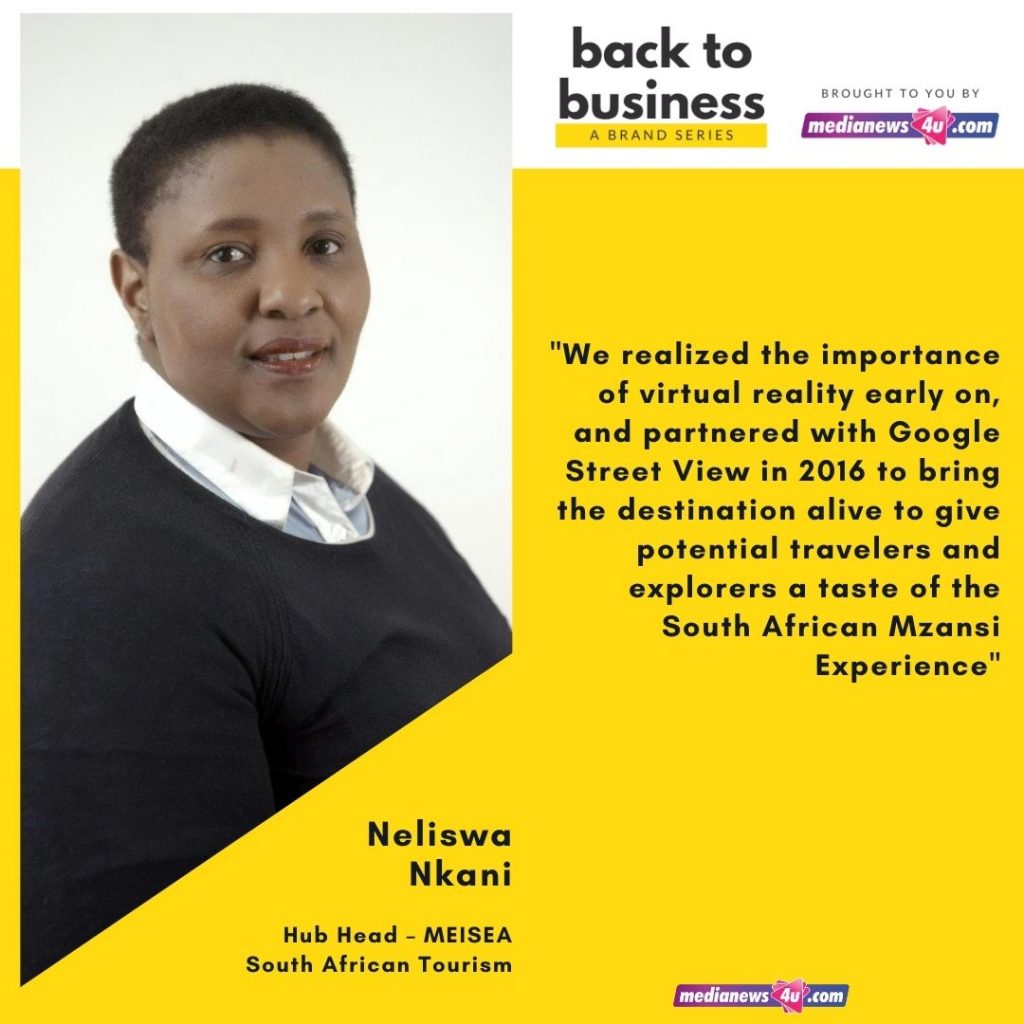
Given the lockdown, Kruger National Park, Ulusaba Private Game Reserve and several other national parks are offering virtual LIVE safaris to viewers from across the world. These virtual shows enable you to interact with an expert game ranger in real-time! Safari vehicles, guides on foot, drones, balloons, rovers and remote cams all roam the terrains of the South Africa, to bring the best possible safari viewing experience to homes.
We are also looking at upskilling and reskilling ourselves and our partners, to identify synergies and sell South Africa in the best possible way to the Indian consumer. As part of this, we are communicating with key travel agents and tour operators directly through two-way knowledge exchange webinars. South African Tourism India has been invested in virtually training over 150 trade each week – across all travel verticals, for the last several weeks, and have also been constantly engaging with consumers, corporate CEOs and MICE leaders to understand sentiment firsthand.
In India, we also hope to launch a 2020 post-Covid campaign, showcasing our new regions and geographies. As traveler’s are expected to give preference to offbeat destinations, and sparsely populated areas – we anticipate that this campaign will propel South Africa’s standing as a destination of choice, once borders open up for travel.
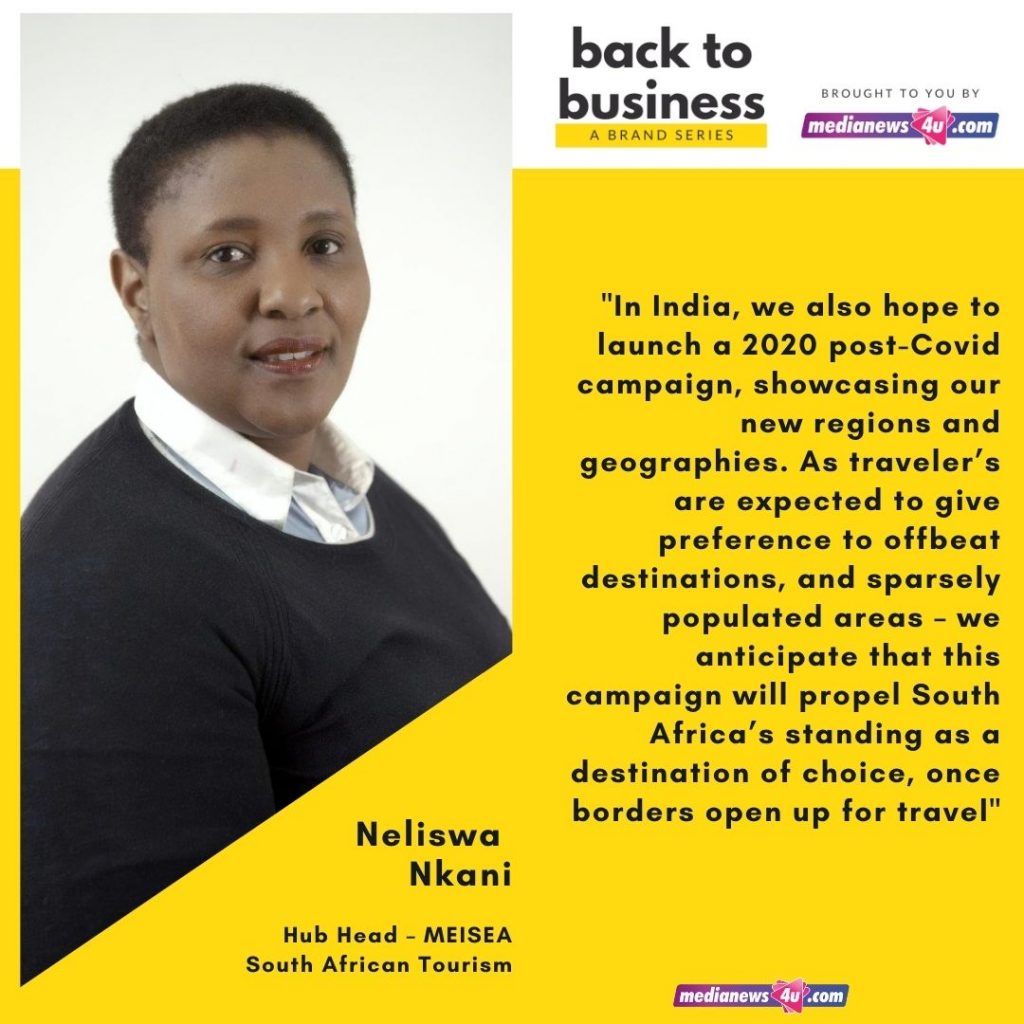
The quest for a solution to a particular crisis helps invent new business opportunities and sometimes leads to a revision of existing business models. What sort of innovation has or will the Covid-19 pandemic bring to your brand?
The tourism sector will need to be fluid and adaptable as we progress through the pandemic – there is no standard template. At South African Tourism, we very quickly learnt that it was important to plan for the future, but even more important to remain agile, nimble, and receptive to changes around us by constantly have our ear to the ground.
As we reorient ourselves, it is imperative that we place the consumer at the center. We need to ensure that we are a part of the consumer thought-process and start packaging accordingly, in order to provide the highest possible value to the end consumer.
Consumers are now going to be more concerned about health and hygiene than ever, hence businesses are going to have to primarily establish and secure consumer confidence. This may mean getting a larger amount of information out onto the public domain regarding safety and hygiene practices, getting certain accreditation procedures in place before stating ‘okay to travel’ etc. Destinations, airlines, travel hubs and experience providers will need to adapt by putting in place and abiding by high, strict health standards. We can also expect to see an increase in requests for personalized and tailored offerings.
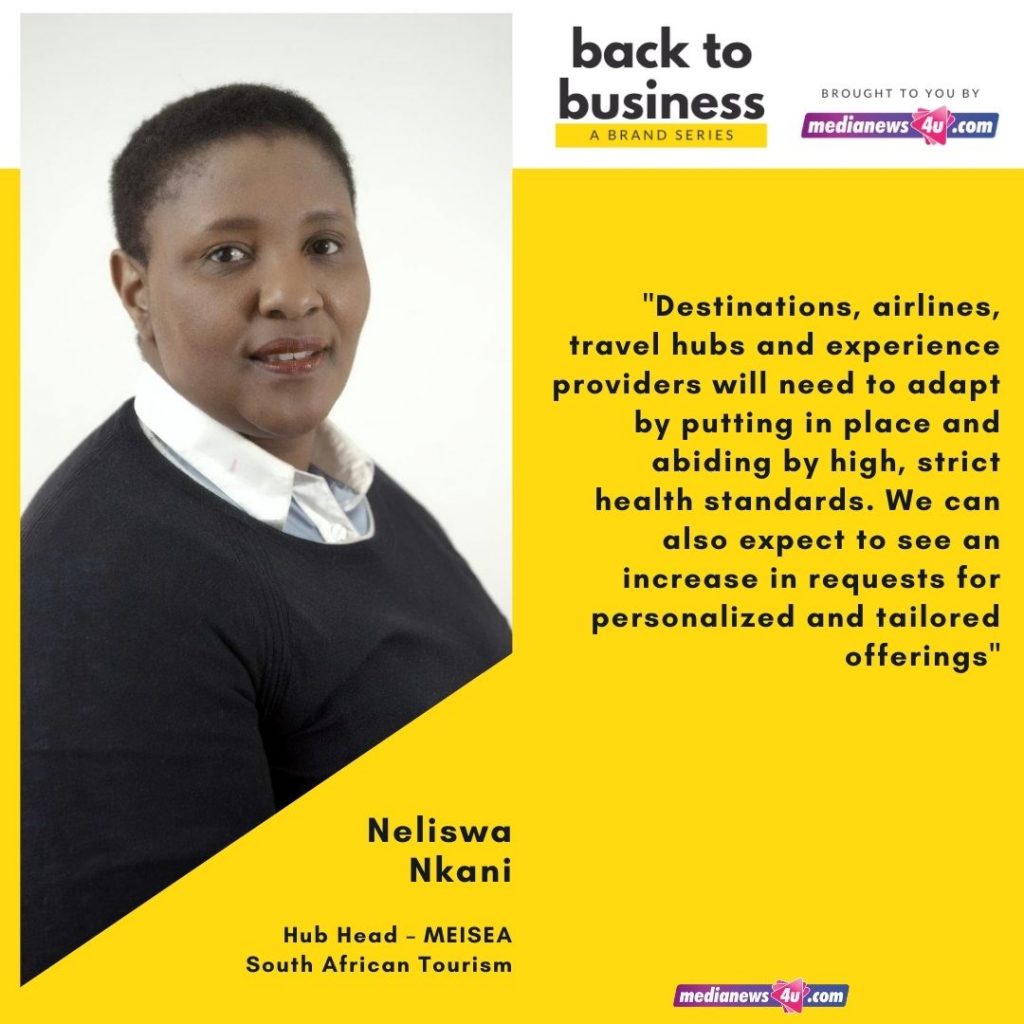
There is the need for a lot more collaborative effort across various levels of the supply chain. It is my sense that ‘airport to airport’ services will be sought by traveler’s looking to book trips. This will mean a deeper level of collaboration between travel specialists, aviation providers, local transport segments, hotels, and product and experiences sellers. Personal engagement will be key to motivating and reassuring travelers.
With International travel to start soon what will be your strategy to the consumers?
For South Africa, have been following a phased approach to reopen and restore travel. The shift is going to be gradual, with emphasis first laid on hyperlocal travel, extending to domestic travel, and then on to regional and international travel.
The government is currently working with airlines and ancillary services, hotels, and other partners down the supply chain to identify effective standard protocols to put in place once South Africa isopenfor international travel again. In the meanwhile, we have put in place various sustenance measures, to help our local tourism businesses stay afloat, with a special focus on small and medium business. To this effect, the Department of Tourism has made an additional R200 million available to assist SMMEs in the tourism and hospitality sector who are under particular stress due to the new travel restrictions.
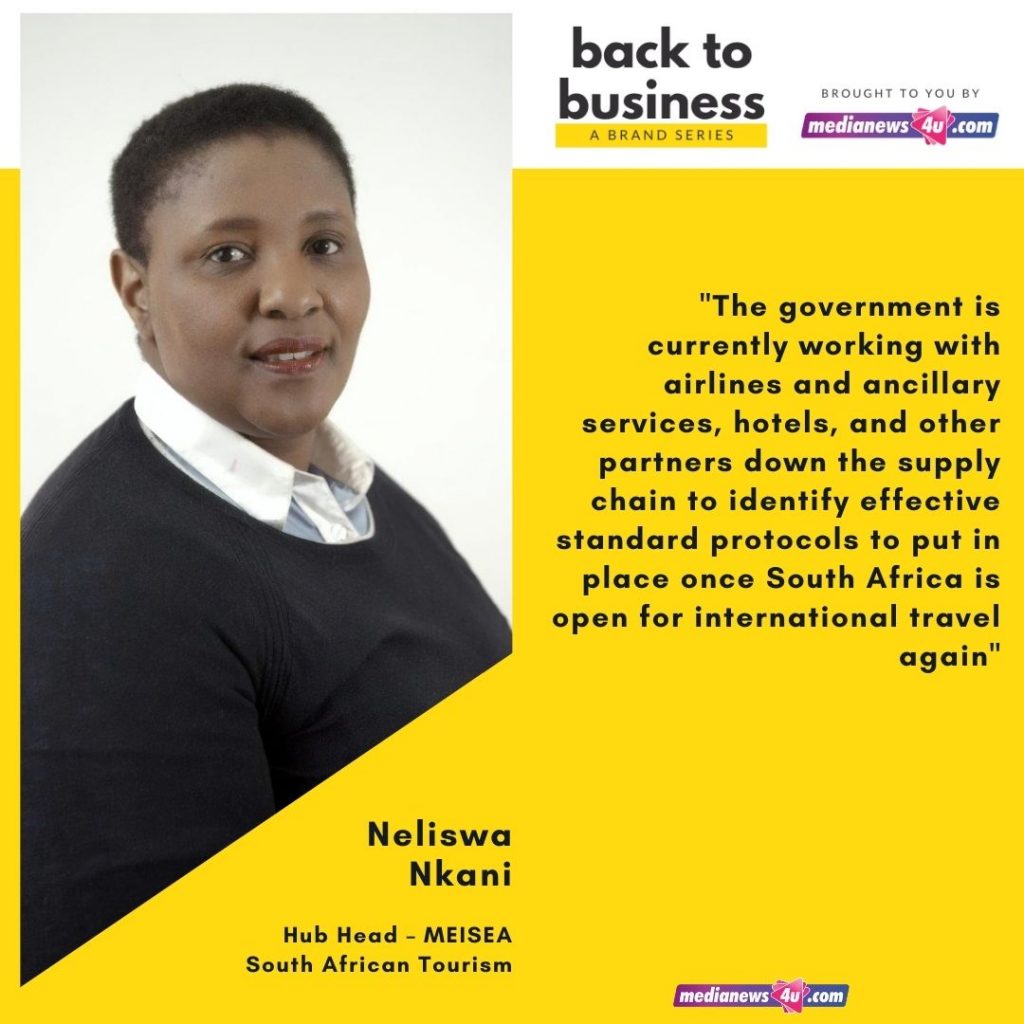
We continue to work together with all the tourism stakeholders in implementing a set of interventions so that we can quickly recover from this temporary setback. These will include readiness for the rollout of the e-visa system, resolving the challenges around the issuance of licenses for tour operators, ensuring that all our campaigns globally and domestically and associated enabling partnerships are in place and ready to be rolled out.
What will be your communication strategy post the opening of the lockdown? What will be the objective of the communication /marketing strategy?
The objective of our communication strategy is simple – to maintain a consumer-centric approach, while also building trust, and instilling confidence in consumers intending to travel.
As demographics are now going to play a huge role in prioritizing markets, our marketing efforts and distribution channels will be phased out and highly targeted. Empty nesters, aged 65 to 75 years old, may not travel immediately. However, we will see a pent up demand or ‘revenge travel’ by 25 to 45-year-olds, who want to make up for lost time.
Travel has been and always will be about people and experiences. While virtual reality is the future of destination marketing, it will not replace the actual, exhilarating travel experience.
We saw a shift in traveler behavior even before the pandemic; traveler’s ceased seeking just scenic views and sightseeing centered itineraries. Accordingly, we moulded ourselves to cater to a new and fast emerging class of traveler’s – those looking for immersive experiences. Whether it was taking local culinary lessons, visiting artisans and craftsmen, undertaking high adrenaline adventure or slow travelling to live like a local, travelling is now even more so about the experience. We are also looking at facilitating an online exchange of cultural experiences between Indian and South African youth, via food. This may mean having virtual cook-offs or sharing traditional recipes in closed groups.
We expect to see the immersive travel trend continue in a post-Covid world, with a greater focus on sustainability. This means that traveler’s will be more conscious of where they spend their money, what kind of accommodation they choose, where they dine, and how they travel locally.
That being said – virtual reality will play a huge part in not only marketing the destination as a whole, but will also be increasingly used by niche or luxury accommodation and product owners. Giving potential traveler’s a look around, albeit through a screen, builds trust and provides an estimate value for money proposition, hence leading to bookings and conversions.
How did you keep the morale of the employees during this lockdown period? On a personal note, what kept you positive?
I have a bunch of optimists for a team. However, the one thing we all missed was human interaction – it was imperative to hold everybody together via video calls and meetings. Little things matter, and it is important to reach out to our colleagues and immediate teams with empathy. It can be as simple as asking about their day, and actively listening to what they have to say.
The lockdown provided us the opportunity to step out of our comfort zones. I am a big believer in the power of personal interactions – however social distancing measures have pushed us to innovate. Everything from the way we interact within our teams, to the way we sell and promote South Africa has changed.
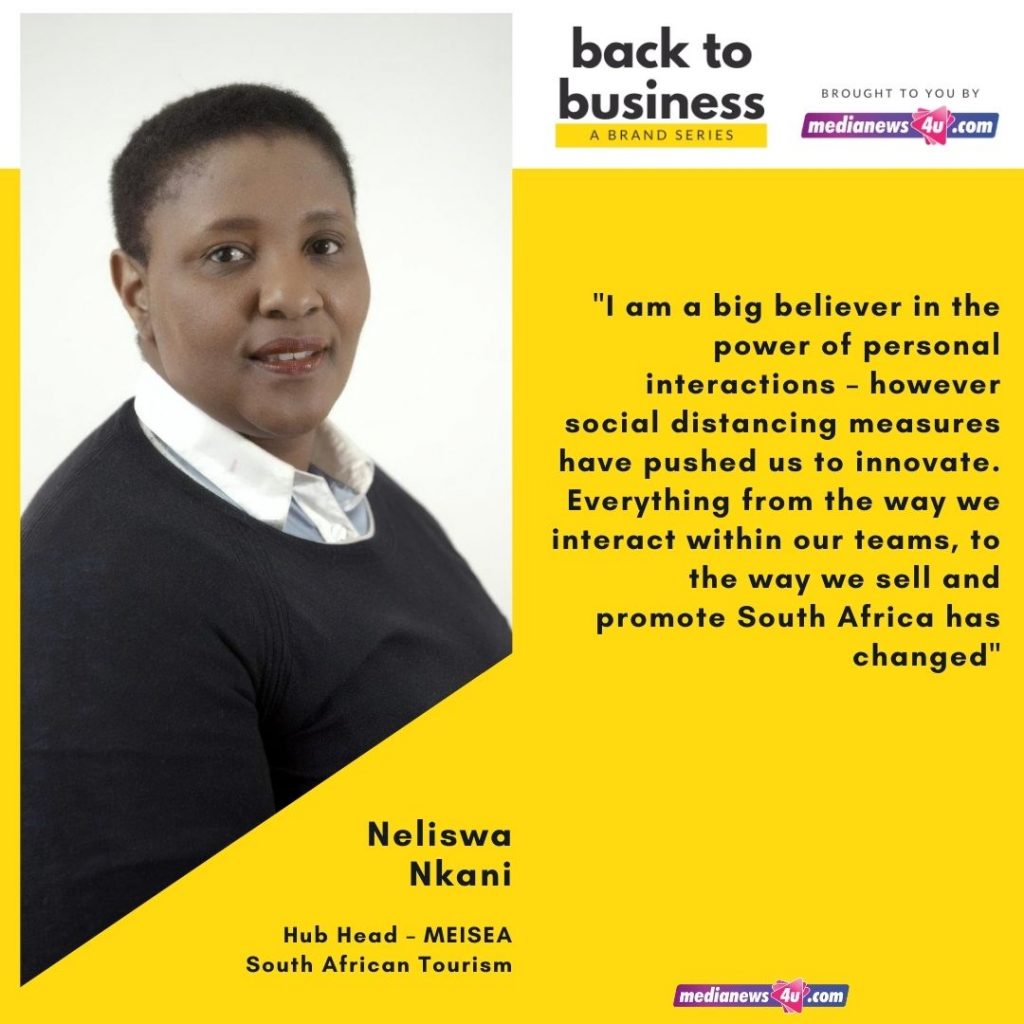
Personally, the lockdown has provided a lot more time and fodder for introspection. I have realized that we lose alignment in the daily hustle-bustle of life. I have been able to reorient and focus on all dimensions of personal wellness – physical, spiritual, mental and emotional. Which means that I make conscious efforts to meditate, exercise more often, be mindful of my diet, read voraciously and spend quality time, albeit virtually, with friends and family.
I have also learnt to look within – we can only give what we have, so to make an impact on society we must first work on ourselves. Happiness is not too complicated or aspirational, and joy can be found in the smallest of things, if we remain purposeful and positive. Your mind is your only home – so keep feeding it with all things good!
What are some of the post-lockdown business strategies that you will use to bring the business back on track or at least get it in the right direction and also create demand for yourself?
These are testing times for the entire tourism sector. All international and domestic travel to South Africa ceased as the destination moved into lockdown from 26th March 2020. We, however, continue to place the safety of our citizens and visitors above all else. It is heartening to see that travelers have chosen to reschedule plans rather than cancel their visit.
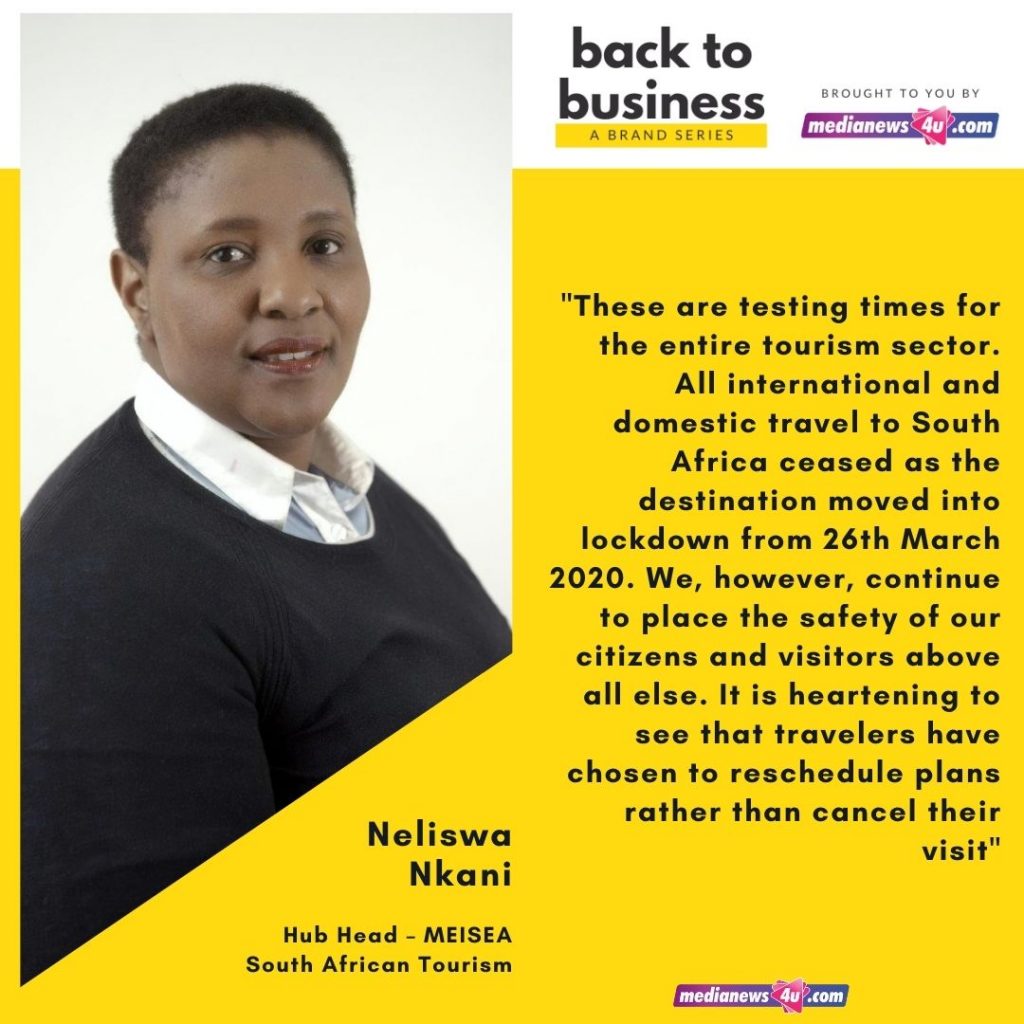
Starting June 1st 2020, South Africa relaxed regulations as the lockdown alert level was lowered from Level 4 to Level 3. At present, we have reinitiated intra-provincial travel for business and leisure – which means that, South Africans looking for quick getaways can book holidays and overnight stays in accredited accommodations, within their own provinces.
We have evaluated the safety measures implemented and the mitigation strategies put in place by all airlines operating in our domestic markets, and are confident that they will assist in containing the spread of the virus. We have also assessed measures being rolled out globally by the aviation industry and benchmarked against them, and encourage responsible and ethical travel.
Recovery for travel is an interdependent process relying on many variable factors, including relaxation of travel restrictions in destination, opening up of source markets, stability of the aviation industry, adapting to and setting up international hygiene standards and protocols.
The lifting of restrictions across the globe is expected to be staggered and gradual – which means that different regions will open themselves for business at varied times. We will hence need to be constantly vigilant and ensure faster turnaround times for identifying various market opportunities and tapping into them.

